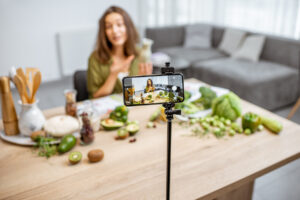Media Literacy and Nutrition

Media literacy is a skill used to understand the content of messages promoted through different media outlets. Examples of media outlets are print like newspapers or magazines, audio like radio shows or podcasts, videos like YouTube channels or other ways people access media through the internet on apps like Instagram or TikTok. Media outlets are one way that important messages are conveyed to the public but it can also be a way that certain businesses can market or advertise products. All individuals are vulnerable to being subconsciously targeted for marketing but teens are at increased risk for being targeted. This is because teens are able to influence both friends and family. Actually, research shows that as a teen, you see more than 40,000 advertisements per year and that’s just on TV! Imagine how many more you might be encountering daily on all the apps you use!
Media literacy is becoming increasingly important because companies have started to strategically target you on the apps they use without them knowing. For example, companies will hire certain Instagram or TikTok accounts that are more popular in order to promote certain products. These people are called “influencers” and they make lots of money promoting products they might not have ever tried! There are lots of famous celebrities who team up with huge companies to try to convince you to buy products. For example, Selena Gomez is known for working with Coca Cola and K-Mart. Or the Kardashians; they can make 1 million dollars on a single Instagram post that promotes products!
Specifically, influencers or advertisements that focus on food, food products, supplements or diets can be potentially harmful for a lot of reasons. For example, influencers might promote a supplement, which are products not carefully regulated by the government. Supplements can contain harmful substances and put you at risk for health complications.
A lot of people have started posting “What I eat in a day” videos which can be super problematic because we all have different nutritional needs! These videos are often focused on “clean” eating, by showing all the “healthy” foods someone might eat. But appropriate nutrition follows an intuitive model, giving your body what it tells you it needs. These type of videos are unrealistic and put you at risk for obsessive thinking about eating and disordered eating which can lead to an eating disorder. Remember, when we start comparing ourselves to other people, or try to imitate their behaviors, we stop being ourselves.
Here are some things you might want to keep in mind when you’re using an app or any media outlet:
- What is the overall message that this is trying to convey?
- Is someone making money off of this? How do I know?
- What, if any, of this information is factual? How do I know?
- What is this person’s background knowledge and/or professional credential? Why would they know more about this subject than the average person?
- What do I feel when I watch this? Am I being emotionally targeted?
People can make all sorts of claims about their credentials online. But remember, a dietitian is not the same as a nutritionist. A dietitian has to go through a lot of education and accreditation to become a registered dietitian (RD or RDN) but anyone can claim they’re a “nutritionist” or “nutrition professional.” It is important to know who to trust regarding current and accurate nutrition recommendations in order to get the best science-based information.

